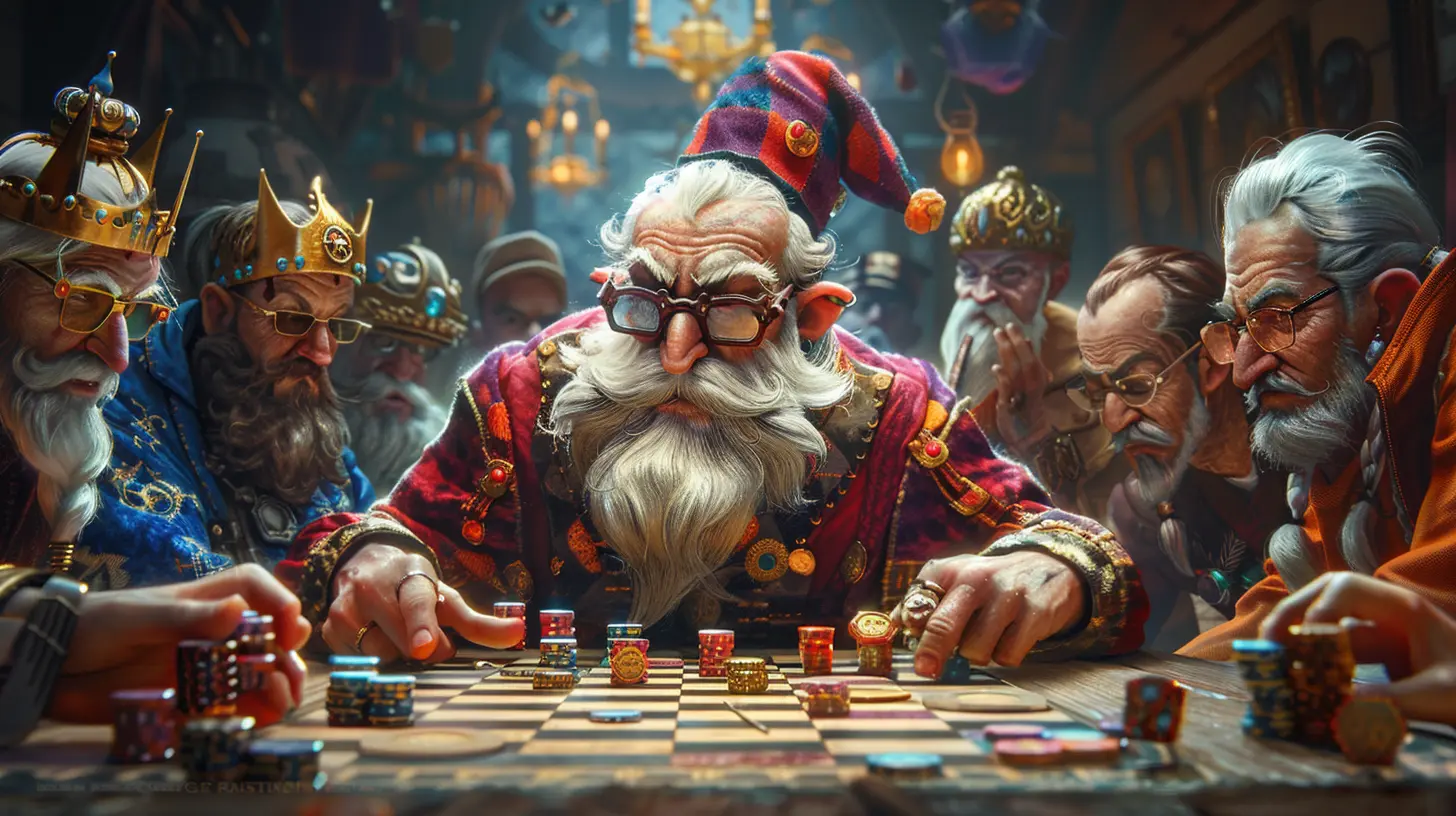Why Cooperative Games Are the Ultimate Test of Team Synergy
5 May 2025
Gaming has always been an excellent way to unwind, connect with friends, and test individual skills. But let’s be honest—games aren’t just about who has the best aim or who can outwit an opponent. Cooperative games bring something entirely different to the table: the power of teamwork. In fact, they’re probably the ultimate test of team synergy. Why? Because success doesn’t just hinge on what you do—it depends on how well you and your crew work together.
Whether you’re defusing bombs, surviving a zombie onslaught, or piloting a starship through intergalactic chaos, cooperative games are a perfect mirror of how people gel (or clash) under pressure. Let’s dive deep into why coop games are the true MVP when it comes to testing team synergy.
What Are Cooperative Games, Anyway?
First, let’s break it down for those who might not be familiar. A cooperative game (or “coop game”) is any game where players work with each other rather than against each other to achieve a shared goal. Unlike competitive games—where it’s all about who’s at the top of the leaderboard—coop games focus on collaboration. Think titles like Overcooked, It Takes Two, or Left 4 Dead.The beauty of these games lies in their ability to bond (or stress-test) players. They challenge you to communicate, plan, adapt, and sometimes even sacrifice personal glory for the greater good. Sound like a relationship exercise? It kind of is.
The Crucial Role of Communication in Cooperative Games
If competitive games are a test of reflexes and strategy, cooperative games are a crash course in effective communication. You can’t just coast through a coop game by doing your own thing. That’s a surefire way to fail miserably. Instead, you’ll need to keep your teammates in the loop at all times.Take Overcooked as an example. In this culinary chaos, you and your teammates are tasked with running a kitchen. But here’s the catch: it’s complete madness. Plates pile up, orders fly in, and your kitchen might even be on fire. If you’re not calling out tasks—“I’m chopping tomatoes! You plate the burgers!”—your chances of succeeding are about as good as winning the lottery twice.
Even games with simpler objectives require solid communication. In Keep Talking and Nobody Explodes, one player defuses a bomb while others provide instructions from a manual. Talk about stress! A calm voice and clear directions can make or break your team here.
Long story short, playing coop games is like practicing for your next team presentation or group project—only way more fun.
Sacrificing Ego for Team Success
Here’s the thing: nobody likes being told they’re doing something wrong, especially in the heat of the moment. But in cooperative games, putting your ego aside is absolutely critical. If you’re too caught up in being the “hero” or proving you’re the best, you’ll sink the whole team.Let’s look at Left 4 Dead. This game pits you and three teammates against hordes of zombies. Sure, you could run ahead and try to be the lone survivor who single-handedly saves the day. But spoiler alert: That strategy will almost always get you into trouble. Instead, the best players stick close to their group, cover each other’s backs, and share resources. Sometimes that even means sacrificing your own health pack for someone else. Yep, teamwork makes the dream work.
This kind of selflessness translates to real life too. Working with others—whether in games or in real-world scenarios—often means compromising and thinking beyond your own needs. Coop games make that painfully (and hilariously) obvious.
Problem-Solving Under Pressure
If you’ve ever played a cooperative game where things went completely sideways, you know how chaotic it can get. Suddenly, your carefully thought-out plan falls apart, and now you’re scrambling to figure out your next move. That’s where problem-solving comes into play.Take It Takes Two, for instance—a beautifully designed game built entirely around cooperation. Every level has puzzles that require input from both players. If one of you is slacking or not paying attention, you’re stuck. It’s kind of like trying to move a couch upstairs: If one person lets go, the whole thing comes tumbling down.
What makes coop games so special is how they force you to think on your feet. When something goes wrong (and it always does at some point), your team has to adapt quickly. You’ll need to assess the situation, come up with a new plan, and execute it—all without turning on each other. It’s like being shoved into a group escape room where the stakes are ridiculously high.
Trust: The Backbone of Team Synergy
Team synergy isn’t just about communication and problem-solving—it’s also about trust. You’ve got to believe that your teammates have your back. Otherwise, what’s the point?Consider Ghost Recon: Wildlands, a tactical shooter where you and your squad infiltrate enemy territory. If one player decides to go full Rambo while the rest of the team is busy planning a stealthy approach, it’s game over. But when everyone trusts the plan and sticks to their role, you’ll feel like an unstoppable force.
This trust-building process is one of the reasons coop games leave such a lasting impression. They create moments where you depend on others—not just for success, but for survival. And honestly, those moments are the ones that make you appreciate your teammates, even if they did accidentally blow up the objective last time.
How Cooperative Games Mirror Real-Life Dynamics
Here’s the kicker: Coop games aren’t just fun—they also offer real insights into how people work together. Playing these games often reveals who’s a natural leader, who thrives under pressure, and who might need a little more support. It’s a social experiment in disguise, really.For instance, if you’ve ever played Sea of Thieves, you know how much coordination it takes to manage a pirate ship. Someone’s steering, someone’s manning the sails, and someone’s firing cannons. If even one person slacks off? Well, let’s just say Davy Jones' locker gets pretty crowded. The same idea applies to team dynamics in the workplace, sports, or any other group activity.
Coop games are an excellent way to pinpoint strengths and weaknesses—both in yourself and others—and work on them together. Plus, they’re a lot more forgiving than real-world scenarios. (When was the last time you got to “respawn” after a bad decision at work?)
Why Team Synergy Is the Real MVP
At the end of the day, cooperative games are less about “winning” and more about how you get there. They test every aspect of team synergy: communication, trust, problem-solving, adaptability, and even patience. It’s easy to focus on individual performance in life, but coop games remind us that working together often yields the best results.Sure, they can be frustrating at times. Yes, you might argue with your friends or accidentally sabotage each other. But isn’t that part of what makes it so rewarding when you finally succeed? Coop games don’t just teach you how to be a better teammate—they also show you how much fun it can be to tackle challenges together.
So, the next time someone asks if you want to play a cooperative game, the answer should be an enthusiastic yes. Just remember to bring your A-game—and maybe a little extra patience.
all images in this post were generated using AI tools
Category:
Cooperative GamesAuthor:

Luke Baker
Discussion
rate this article
4 comments
Kieran McKittrick
Cooperative games truly shine in showcasing team synergy. They require players to communicate effectively, strategize together, and support each other. It's fascinating to see how diverse skills can merge into a cohesive unit, leading to memorable shared experiences.
May 12, 2025 at 4:10 PM

Luke Baker
Thank you for your insightful comment! I completely agree—cooperative games really do highlight the magic of teamwork and the power of diverse skills coming together.
Arianth Gutierrez
Great article! Cooperative games really highlight the beauty of teamwork and synergy. It's amazing how working together can turn challenges into unforgettable experiences. Keep up the fantastic content!
May 11, 2025 at 4:50 PM

Luke Baker
Thank you for your kind words! I'm glad you enjoyed the article and appreciate the emphasis on teamwork in cooperative games.
Mara McMurtry
What a fantastic read! Cooperative games truly highlight the magic of teamwork and synergy. It’s amazing how these experiences can strengthen bonds and communication among players. Looking forward to more insightful articles like this!
May 10, 2025 at 3:22 AM

Luke Baker
Thank you so much for your kind words! I'm glad you enjoyed the article and appreciate the insights on teamwork in cooperative games. Stay tuned for more!
Lola McCarron
Cooperative games: where teamwork is tested, friendships are forged, and the only betrayal allowed is when someone steals the last slice of pizza!
May 8, 2025 at 3:07 AM

Luke Baker
Absolutely! Cooperative games bring out the best and worst in teamwork, making every slice—both metaphorical and literal—count!



